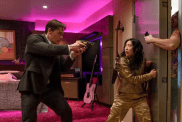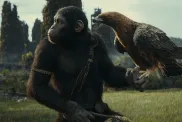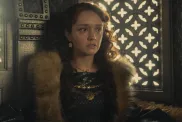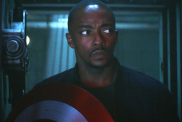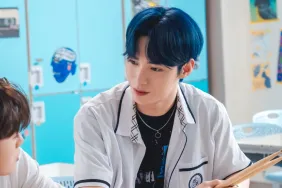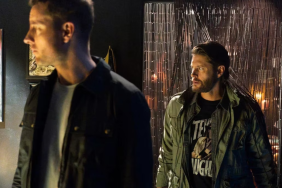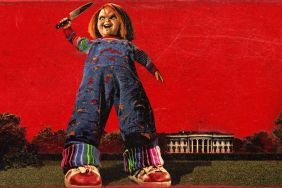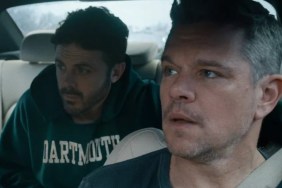
A decade after the series’ fourth season, Genndy Tartakovsky’s Samurai Jack returns
Thirteen years after the show’s original four-season run on Cartoon Network, Jack is back. This Saturday marks the return of Genndy Tartakovsky’s animated hero as the fifth and final season of Samurai Jack begins on Adult Swim March 11 at 11:00pm ET/PT.
RELATED: The Samurai Jack Season 5 Trailer is Here!
It’s been 50 years since we last saw the time-displaced hero and the years have not been kind. Aku has destroyed every time portal and Jack (Phil Lamarr) has stopped aging, a side effect of time travel. It seems he is cursed to just roam the land for all eternity. His past haunts him as well as a cult of assassins dedicated to killing him for Aku’s glory.
CS recently had the chance to sit down with Tartakovsky, whose creative vision for the character comes to a close with ten final episodes. Tartakovsky, who has known the show’s ending for years, discusses the decision to bring back Jack as a darker and more mature samurai warrior.
Samurai Jack season 5 is created, executive produced and directed by Genndy Tartakovsky and produced by Cartoon Network Studios.
CS: It seems that, in some ways, “Samurai Jack” has aged alongside its audience.
Genndy Tartakovsky: It wasn’t intentional. It’s just sort of where our filmmaking is today. I think we’re trying to do the same things. The quiet and the loud. The fast and the slow. The biggest change, I think, is that because it’s all one story, we can take our time. You’re not driven to this end or a certain resolution. You can keep it going. That changes things. Then I think we’re just better. The sequence of the girls walking through the catacombs with that music? To me, that’s what it’s all about. Or the rain sequence. There’s a lot of moments like that. The quiet with the wolf walking, mirroring Jack. It’s all the same stuff we were doing before, but now we’re doing it better an more mature. We don’t have to explain ourselves as much.
CS: In the earlier episodes, Jack was unquestionably the good guy. Now it seems that he’s questioning whether or not he’s really doing the right thing?
Genndy Tartakovsky: It’s soul searching rather than everything on the surface. The first series is very good or bad. Jack does the right thing all the time. I don’t think we ever really dove into it deeper than that. With this, we’re diving in right from the first episode. Wow, he went past those people and he didn’t help them. The haunting of the past is my favorite thing. Then his dialogue with himself. His turmoil is his fun because we never really got to get it to this level.

CS: I know you’ve had the ending in mind for years and years, but did you always plan the 50-year time jump?
Genndy Tartakovsky: No, actually. That came in when we started doing it. We realized that it felt wrong to have it be episode 53, just carrying on from that baby episode. We wanted time passage so, as we discussed it, the natural thing became the jump. Because it was time travel, maybe there was some fault in it that we’re just discovering now.
CS: It also leaves you some unexplored territory. I know you mentioned that the “Samurai Jack” comics are not canon, but having that 50-year stretch feels like the perfect place for legends of Jack to thrive.
Genndy Tartakovsky: That was another reason for it. You always want to build in a back door for yourself just in case. Or have some kind of parachute. For whatever reason, even though I’m not planning to, if somebody wanted to make more or somebody for some reason wanted to make more, I’ve got that 50 years where I can jump in and do something.
CS: How mapped out are those 50 years for you?
Genndy Tartakovsky: There are some things that we definitely know. But it’s not like there’s a villain that I know he fights in, say, episode 75. Its not that specific.
CS: “Samurai Jack” is one of many shows returning after long absences. Is there any correlation there?
Genndy Tartakovsky: It’s completely its own thing. It wasn’t done because I was going “Oh, they brought that show back, let’s bring my show back!” Literally, I have been getting yelled out since we stopped. The show has only gotten more popular. That’s the weird thing. We’re more popular now than we were when the show was on. Maybe it was before its time. Maybe the network didn’t know how to sell it. It’s a strange show, especially back in the day when there was nothing else like it. Now it just felt like the right time. The story is true. I finished “Hotel 2” and I wasn’t sure what was next. I was emotionally drained from “Popeye,” my other feature, getting cancelled. I was asking, “What should I do?” and this was always in the back of my head. I thought I’d send an exploratory e-mail. I got a great reaction from it and, within two weeks, it was ready to go. I believe in fate.
CS: “Samurai Jack” has always excelled at depicting a sort of Joseph Campbell multiverse. A decade later, are there new pop culture elements that lead to some of the faces Jack will encounter on his final journeys?
Genndy Tartakovsky: No, probably fewer things. There’s only so many times we can reference a “Star Wars” line before it’s like, “All right, let’s move on.” I think we want to be more unique, especially now that Jack has evolved into whatever it is. You want to be true to that universe. There are things that have influenced my life that, if you really knew everything I love, you would pick out. “Oh, that feels like that little moment!” There are even more that are so super hyper nerdy that I’m not sure anyone will ever get them. But I know that I’m referencing this because it was special in my life. After having kids, there’s a bit of that that seeps in. I’m almost 50. You’re a different filmmaker than when you’re 28 or 29.

CS: Does the new season reflect how you yourself has changed as storyteller?
Genndy Tartakovsky: I think that the maturity of it is a factor. We’re better storytellers. I’m a better filmmaker than I was 12 years ago. I’ve learned a lot. I’ve made mistakes. I can do it with more confidence. I mean, I’m still as insecure as anyone else, but when I put it down on paper and I pitch it and it works, I know it works. When we have a joke, it always lands. I mean, comedy is subjective but, when we do a screening for the crew, people laugh at the right places. Before, especially on ‘Dexter,’ I always had the feeling of, “Oh s—t, I don’t know if this is going to work.” It was a grab bag. And because we were able to storyboard all the episodes ourselves, it’s a different thing. It’s much tighter.
CS: “Samurai Jack” has always had a unique sense of humor. I think my favorite joke was the “Dragon’s Lair”/”Space Ace” gag from the second season.
Genndy Tartakovsky: That was this guy in the room, Aaron Springer. Everybody in the room cried laughing at that line. It’s just stupid enough. It’s for us. It’s for people who have grown up with all those things.
CS: The series is influenced by a great many things, from true history to modern storytelling. Do you re-immerse yourself in anything before diving back into the world?
Genndy Tartakovsky: I think they’re there. I don’t think I watched anything going into this season. It was so fresh in my head and I was so excited to storyboard again and storyboard for myself. With this, it was so much more about the character than about making it different. It’s a different muscle. Making a feature like “Hotel 3” or “Hotel 2” is kind of fun and and jokey. It doesn’t take itself too seriously. You could do whatever you want, basically. Then this is more creative with pathos and mood and I want to tell each sequence in a unique way. It was great to flex that muscle again. It’s just me.
CS: Was it tricky to balance your work on “Samurai Jack” with the upcoming “Hotel Transylvania 3”?
Genndy Tartakovsky: Luckily, it was just the end of storyboarding on Jack and the beginning of storyboarding on that. They overlapped a little bit, but not too much. Plus, it’s not like I’m doing all the boarding on that. I have a staff of about ten people. It’s about launching them and then you wait about two weeks for them to pitch you back. It’s different. I couldn’t do the whole season like that, but just what we had was okay.

CS: Is the “Popeye” movie definitely dead?
Genndy Tartakovsky: It’s done. Well, it’s done for me. I don’t know where it is in the universe, but for me, it’s done.
CS: Do you have any interest in one day working in live action?
Genndy Tartakovsky: I do! It’s not my priority, because animation is my life. I’ve always thought that maybe I need to do a live-action movie, have it make a lot of money, and then come back and have a bigger budget for animation and do more with that. That’s kind of the big plan, but who knows? Live action is exciting and fun and is an even bigger stage, but doing “Jack” has been one of the greatest experiences of my life.
CS: Is there a continuing education required in animation? Do you need to keep up with new technologies?
Genndy Tartakovsky: As far as education goes, the technology has run way past me. Luckily, as a director I can just tell people what I need and I don’t need to tell them how to get it. That was part of the nice relationship with Sony Pictures Imageworks. I could say, “I want it to look like this and that” and hand them a thumbnail. They could figure everything out. For me, it’s really awkward. Going through television, I knew every part of the job. I could do the writing and I knew how to use the camera and do post production. I had done it all in my career. I always fell, as a kid, that that’s what a director needed to be. Hitchcock could do anything in my mind. He’s the director. That person has to be the best actor, the best designer, the best cinematographer. Then I came to realize that isn’t the case. You just need to surround yourself with the best. I saw an interview with Bernard Herrmann where he said, “Oh yeah, Hitch would just give me the print and I’d put music on it.” He wouldn’t even spot it. When I found Scott [Wills], I could just tell him I wanted this mood. If I gave him a color, he’d throw a painting at me. I’m hiring him for him. Then he’d bring me back something I could never have imagined. That’s what you want. You want people around you that are twice as good as you are. That makes me look really good.
Samurai Jack
-
Samurai Jack

-
Samurai Jack

-
Samurai Jack

-
Samurai Jack

-
Samurai Jack

-
Samurai Jack

-
Samurai Jack

-
Samurai Jack

-
Samurai Jack

-
Samurai Jack

-
Samurai Jack

